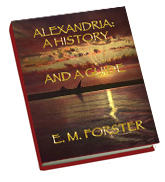E.M. Forster’s
ALEXANDRIA: A HISTORY AND A GUIDE
THE FONTHILL EDITION
 Back in Alexandria again, [Cleopatra] watched the second duel—that between Mark Antony and Caesar’s murderers. She helped neither party, and when Antony won he summoned her... She came,
not in a carpet but in a gilded barge, and her life henceforward belongs less to history than to poetry...
Voluptuous but watchful, she treated her new lover as she had treated her old. She never bored him,
and since grossness means monotony she sharpened his mind to those more delicate delights, where
sense verges into spirit. Her infinite variety lay in that. She was the last of a secluded and subtle race,
she was a flower that Alexandria had taken three hundred years to produce and that eternity cannot
wither. Back in Alexandria again, [Cleopatra] watched the second duel—that between Mark Antony and Caesar’s murderers. She helped neither party, and when Antony won he summoned her... She came,
not in a carpet but in a gilded barge, and her life henceforward belongs less to history than to poetry...
Voluptuous but watchful, she treated her new lover as she had treated her old. She never bored him,
and since grossness means monotony she sharpened his mind to those more delicate delights, where
sense verges into spirit. Her infinite variety lay in that. She was the last of a secluded and subtle race,
she was a flower that Alexandria had taken three hundred years to produce and that eternity cannot
wither.
from ALEXANDRIA: A HISTORY AND A GUIDE
Widely regarded as “the best guidebook ever written” E. M. Forster’s
ALEXANDRIA remains one of the most rare and least explored of his works—an
evocative, informative exploration of that most fabled, exotic and elusive of all the
world’s cities.
Now for the first time ever Forster’s ALEXANDRIA appears in eBook format, and
the release of the Fonthill Edition in 2012 coincides with the book’s 90th anniversary.
Forster spent several of the most influential years of his life in Alexandria—that ever
complex, ever-enduring, multi-faceted ancient/modern city founded by Alexander
the Great more than two millennia ago. Perhaps the world’s first truly cosmopolitan
city, Alexandria remains forever intriguing. More than either a History or a Guide
Forster’s ALEXANDRIA, as Lawrence Durrell noted, is an exquisite labour of love.
FOREWORD
FONTHILL PRESS LLC is pleased to release E. M. Forster’s overlooked and under-read
1922 classic Alexandria: A History and a Guide. This is the first eBook edition of Mr Forster’s
Alexandria, and its release in 2012 coincides with the book’s 90th anniversary.
As we might assume, much has changed in Alexandria during those 90 years; streets
bearing French names at that time are now in Arabic; tramlines have disappeared and the
Greco-Roman Museum has wings and alcoves that Mr Forster may certainly have enjoyed
wandering through, recording his thoughts, scribbling his notes. A list of Alexandrian
changes could go on for pages. As Robert Tracey pointed out in 1961: as a travel guide,
strictly speaking, much of the information here is “obsolete.” And to say the least, the
ensuing half century has scarcely altered that fact—and yet Alexandria clings to its many
charms and to an essential spirit whose relevance time and change and revolution can
scarcely alter or diminish; indeed, one can say this little gem still lends pleasurable reading for
the traveller, whether one finds oneself reading these pages in the vicinity of the “Soma”—
the vanished tomb of Alexander the Great, an ancient site of pilgrimage for common folk
and Caesars alike—or snuggled into a cosy fireside chair, an ocean and a continent or two
away from the brilliant Mediterranean sun.
The quirks and eccentricities in Mr Forster’s 1922 Alexandria abide in FONTHILL’S
digital offering; nevertheless, here and there, now and again, we have chosen to correct this
or that, for instance: the spelling of the surname of Dante Gabriel Rossetti, which hitherto
suffered from a missing ‘s’ (whether the first or second, we could not tell). Things of that
sort. Nevertheless, we have done what we can to heed and duly note Mr Forster’s stinging
reproach to grammarians (editors and proofreaders?) everywhere: “Grammar is a valuable
subject, but also a dangerous one, for it naturally attracts pedants and schoolmasters and all who
think that Literature is an affair of rules.”
Point taken, Mr Forster.
We have added a few illustrations that we think the author might have approved and
used, had they been available; most he did use in 1922 have been used anew, albeit digitally
enhanced. At the end of most sections in the ‘Guide’ you will find a brief listing of place
names, which Mr Forster accompanied with page numbers directing his readers to sections
in the ‘History,’ thus linking the two. Pages numbers are for printed books; in digital format,
names and subjects can be searched electronically, and this is especially easy in
FONTHILL’s enhanced digital edition.
Finally, we are deeply grateful to Dr David Cowart, distinguished scholar and author of
Thomas Pynchon and the Dark Passages of History, etc., for graciously according FONTHILL the
privilege to publish “Where Sense Verges into Spirit: E. M. Forster’s Alexandria,” a pleasing
find, and certainly one of the most insightful and engaging essays to ever appear on Mr.
Forster’s book.
William G. Beckford, Publisher
FONTHILL PRESS
New York/Winchester, UK
from the INTRODUCTION
WHERE SENSE VERGES INTO SPIRIT:
E. M. FORSTER’S ALEXANDRIA
Homer tells how Menelaus was becalmed on Pharos as he returned from Troy, and how he
could not get away until he had entrapped Proteus, the divine king of the island, and exacted
a favorable wind (see opening passages of Forster’, Alexandria).
Age cannot wither her. Cleopatra, twenty centuries past her prime, continues to attract
us. In the central chapter of Alexandria: A History and a Guide, E. M. Forster declares himself
another votary of this last great representative of the dynasty that stretches, “like a rare and
fragile chain,” backward to Alexander. A close look at Forster’s Cleopatra may allow readers
to see a neglected text with fresh eyes, to recognize it as an imaginative work of no small
consequence, and even to descry an uncanny anticipation of the postcolonial perspectives
that, by century’s end, would complicate our understanding of subject populations and their
female exemplars…
In his meditation on Egypt’s great queen and her city, Forster compels recognition of
the essential schizophrenia of expatriation across its full spectrum, from tourism to
colonialism. The schizophrenia begins with the title, for Forster’s book purports to situate
Alexandria in time and to describe it in space—to be history and guide. Both of the terms in
this binary exhibit their own sublevel fissuring. The first term, history, may beckon with the
promise of linear unity, but it always breaks down into Eliot’s many cunning passages. The
second term is equally vexed: who is to be guided? The tourist? The antiquary? The colonial
official? Can the would-be cicerone find a voice suited to every visitor? History notoriously
is his story and our story, seldom her story or their story. In Alexandria of all places there are
in the house of history many mansions—at least one for every empire that has laid claim to this corner of the Mediterranean. Struggling to write history from an Alexandrian vantage
(and in one crucial chapter from the perspective of the city’s most famous indigenous
queen), a twentieth-century Englishman faces a daunting task.
One sees a basic division in the very activity that requires a guide. Is one to be a traveler
or a tourist? According to the classic distinction, travelers seek to encounter foreign
experience in as much depth and authenticity as possible; mere tourists, on the other hand,
seek to take their familiar world with them, wanting a sterile envelope from which to marvel
at the doubtless septic sights of Abroad. Thus the author of such a text, the guide who writes
the guidebook, must often strike a precarious balance between counseling tourists on how to
live as though they were at home and counseling the traveler on how to live like a native…
* David Cowart’s “Where Sense Verges into Spirit: Forster’s Alexandria ” originally appeared in a slightly
different version in the Michigan Quarterly Review.
DAVID COWART
Lousie Fry Scudder Professor
English Language and Literature
University of South Carolina
|



 Back in Alexandria again, [Cleopatra] watched the second duel—that between Mark Antony and Caesar’s murderers. She helped neither party, and when Antony won he summoned her... She came,
not in a carpet but in a gilded barge, and her life henceforward belongs less to history than to poetry...
Voluptuous but watchful, she treated her new lover as she had treated her old. She never bored him,
and since grossness means monotony she sharpened his mind to those more delicate delights, where
sense verges into spirit. Her infinite variety lay in that. She was the last of a secluded and subtle race,
she was a flower that Alexandria had taken three hundred years to produce and that eternity cannot
wither.
Back in Alexandria again, [Cleopatra] watched the second duel—that between Mark Antony and Caesar’s murderers. She helped neither party, and when Antony won he summoned her... She came,
not in a carpet but in a gilded barge, and her life henceforward belongs less to history than to poetry...
Voluptuous but watchful, she treated her new lover as she had treated her old. She never bored him,
and since grossness means monotony she sharpened his mind to those more delicate delights, where
sense verges into spirit. Her infinite variety lay in that. She was the last of a secluded and subtle race,
she was a flower that Alexandria had taken three hundred years to produce and that eternity cannot
wither.